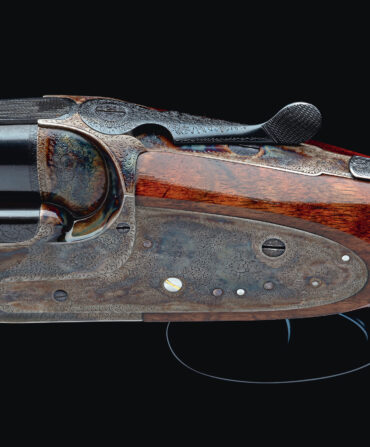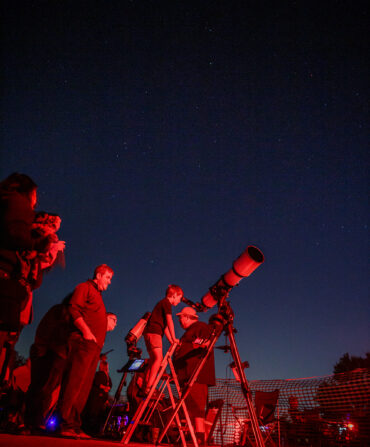Strolling down the gravel path at the Broyhill Equestrian Preserve last July, I felt a sense of déjà vu. I’d never visited the Western North Carolina venue, home to the Blowing Rock Charity Horse Show, but my mother and grandmother had, and it seemed familiar. The scents of oiled leather and citronella fly spray mingled in the crisp piney air of the surrounding Blue Ridge Mountains. A loudspeaker crackled, and I heard hoofbeats thundering—the smells and sounds of my childhood. My stomach fluttered, anticipating my own moment in the saddle, even though that wasn’t to come. Not this weekend, at least.

Although its atmosphere is reminiscent of other equestrian competitions, Blowing Rock has an impressive pedigree: The two-week affair is the country’s longest continuously running horse show, and celebrated its centennial last year. What began as informal revelry, showcasing horseback games to entertain guests at the nearby Green Park Hotel, has morphed into a destination event for generations of riders across the Southeast.
Each summer throughout the sixties, my grandmother, mother, and aunt made the trek from their Charlotte farm, piling into an RV with a bumper-pull trailer hitched behind. As the family matriarch, my grandmother Alice was a slight, stern—and vaguely terrifying—woman who harbored a fierce love of animals and tradition. She served as the Master of Foxhounds at the local hunt club in Mecklenburg County, and I recalled stories of her leading the field with her treasured hounds. I pictured her here in Blowing Rock, aboard a rangy Thoroughbred, buttoning her tweed jacket as early-morning fog crept from the mountains.

This time, under the towering eighty-year-old grandstands adorned with flittering ferns and tricolor bunting, my daughter peered over the rail, watching horses navigate the jumps carved from local birch. Her terrier whined for attention, winding its leash around her coltish legs. She could’ve been me thirty years ago, at any of the dozens of shows I attended, often impatiently waiting for my own turn in the ring. Or my mother, who most likely stood in this same spot decades before, holding the braided reins of her freshly scrubbed pony.
I shivered in the unseasonable chill as I shook hands with Burr Collier, the president of the show’s foundation, who competed as a teenager and has attended for more than fifty years. “We own the weather here—it rarely gets above the eighties,” he said with a smile. “It’s part of our charm.” But it’s not just the cool temps that generate sellout entries every year. “It’s more than just a horse show; it’s family,” Collier continued. “It’s good sport, in the old sense of the word. We don’t have cutthroat competition. Everyone cheers for one another.” Those who rode here as children return annually with their own progeny, and if they can’t attend one year, they send donations to support the foundation, which became a nonprofit in 1999.
Between two arenas, manicured lawns with Adirondack chairs and picnic tables invite spectators to linger. “We wanted this to be an intimate venue, a break from your typical ‘factory’ horse show,” Collier explained. A hydrangea-hedged winner’s circle serves as a daily gathering spot, the tables decorated with antique etched trophies. Around four o’clock, folks amble down from the stables or grandstands to a pavilion for cocktails and conversation.

Community involvement has been the show’s lifeblood, ever since Lloyd M. Tate, a horseman from Pinehurst, created the first “fun show,” back in 1923. To draw attention to the event, an early program cover featured a photo of Tate’s son piloting a horse over a convertible. The publicity worked—the show has become the social event of the year in Blowing Rock. Out-of-towners bring their families and rent a house for the duration and host dinner parties, Collier said. With no events scheduled on Mondays, visitors usually take the day off to fish Bass Lake, hike Grandfather Mountain, or go white-water rafting near Boone. Or they wander the downtown, with its cluster of quaint boutiques and the sweets shop Kilwins, a must-visit on Main Street since 1947.
Beside an arena during my visit, the veteran horse trainer Jack Towell told me that long ago, the parking area featured an “outside course” where horses jumped beyond the ring. “It was easy to lose sight of riders in the fog, especially if they were on a gray,” he said, gesturing toward the sloping hillside. I pictured my mother’s ghost-white pony careening through the mist, like a pudgy unicorn, charging toward a post-and-rail fence.
These horsemen’s reverence for ritual—and their keen memories—astounded me. More than once, strangers asked me about my family (“Your mom had that cute gray pony named Dublin, right?”). Even though Alice passed away in 2019 and never got the chance to hand over the reins to her great-granddaughter, I know we’ll return to Blowing Rock. It’s never too late to revive a tradition.








